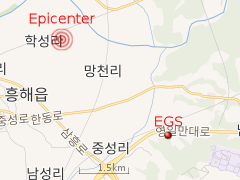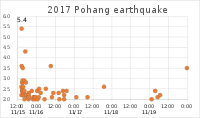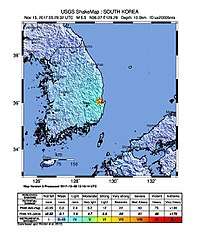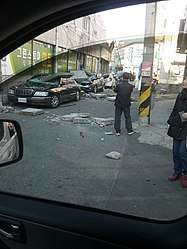2017 Pohang earthquake
The 2017 Pohang earthquake, measuring magnitude 5.4 on the moment magnitude scale, struck Heunghae, Pohang, North Gyeongsang Province, South Korea on November 15 2017.[2] It is tied with the 2016 Gyeongju earthquake as the country's strongest earthquake in modern history.
  2017 Pohang earthquake (South Korea) | |
| UTC time | 2017-11-15 05:29:32 |
|---|---|
| ISC event | 611461139 |
| USGS-ANSS | ComCat |
| Local date | 15 November 2017 |
| Local time | 14:29:31 KST[1] |
| Magnitude | Mw(KMA) 5.4[1] |
| Depth | 9 km[1] |
| Epicenter | 36.12°N 129.36°E |
| Type | Reverse-Thrust |
| Areas affected | Pohang, Ulsan, Daegu |
| Max. intensity | VII (Very strong) |
| Peak acceleration | 0.58 g |
| Tsunami | No |
| Foreshocks | M 2.6 (14:22:32 KST) M 2.2 (14:22:44 KST) |
| Casualties | 82 injured |
 |
| Water injection well of an Enhanced geothermal system (EGS) might have triggered the earthquake |
Earthquake
The earthquake, along with several aftershocks, caused significant infrastructure damage in the southern port city of Pohang. At least 82 people were injured in the earthquake, including 15 people who were hospitalized. About 1,124 people stayed in temporary shelters after they had to leave their home.[3]
 Aftershocks of the earthquake
Aftershocks of the earthquake Shakemap for the earthquake
Shakemap for the earthquake Crumbled walls piled on damaged cars in Pohang, South Korea
Crumbled walls piled on damaged cars in Pohang, South Korea
Result
According to an initial assessment by the Ministry of the Interior and Safety, the earthquake damaged 2,165 private properties, including 1,988 private houses. Of those, 52 homes suffered severe damage and 157 suffered serious damage.[3]
Damage was also reported at 227 schools across the region, 107 of them in Pohang, 44 in Ulsan and 26 in Daegu. Furthermore, damage was reported at 79 public offices and parks, 23 port facilities, 7 roads, 90 shops, 77 factories, and 11 bridges.[3]
Nearly 20,000 people, including soldiers, were mobilized to help clear debris and to assist in restoration works. More than 80 percent of damaged properties were restored within 4 days of the initial earthquake.[3]
A seismograph installed nearby epicenter of this earthquake measured peak ground acceleration (PGA) of 0.58 g; Due to Pohang City's poor subsoil area, seismic wave amplified while passing through, making the damage somewhat heavier than the 5.8 magnitude 2016 Gyeongju earthquake. 0.58g of PGA is about equivalent to MMI Intensity VIII to IX.[4]
The mainly caused fault of this earthquake was under debate; initially Yangsan Fault was thought to be the cause of this earthquake, however days later Korea Meteorological Administration (KMA) announced that Jangsa fault - a branch fault of Yangsan fault - is main cause of the earthquake. However, Korea Institute of Geoscience and Mineral Resources (KIGAM) analyzed that the unknown fault caused this earthquake.[5] Water injection in the ground by the geothermal plant in Pohang might have also triggered the earthquake.[6][7]
The College Scholastic Ability Test was delayed by one week both to change testing sites and allow nerves a chance to relax from the quake.[8][9]
References
- "발생시각 2017년 11월 15일 14시 29분 31초 규모 5.4". Korea Meteorological Administration. 15 November 2017. Retrieved 15 November 2017.
- "South Korea earthquake: Tremors that rocked Pohang were second-strongest on record". The Independent. 16 November 2017. Retrieved 18 November 2017.
- "Pohang quakes damage some 2,000 houses, 227 schools". Yonhap. 19 November 2017.
- "연약한 지반이 지진 피해 키웠다…실제 충격은 규모 7.4".
- "<포항 5.4 强震>"포항 강진, 장사단층 아닌 無名단층서 발생"".
- Grigoli, F.; Cesca, S.; Rinaldi, A. P.; Manconi, A.; López-Comino, J. A.; Clinton, J. F.; Westaway, R.; Cauzzi, C.; Dahm, T.; Wiemer, S. (1 June 2018). "The November 2017 Mw 5.5 Pohang earthquake: A possible case of induced seismicity in South Korea". Science. 360 (6392): 1003–1006. doi:10.1126/science.aat2010. PMID 29700226.
- Kim, Kwang-Hee; Ree, Jin-Han; Kim, YoungHee; Kim, Sungshil; Kang, Su Young; Seo, Wooseok (1 June 2018). "Assessing whether the 2017 Mw 5.4 Pohang earthquake in South Korea was an induced event". Science. 360 (6392): 1007–1009. doi:10.1126/science.aat6081. ISSN 0036-8075. PMID 29700224.
- "South Korea quiet for quake-delayed college entrance exam". The Straits Times. 23 November 2017. Retrieved 15 March 2019.
- Kim, Jung-hee; Cho, Han-dae (16 November 2017). "CSAT delay causes chain reaction of changes". JoongAng Ilbo. Retrieved 15 March 2019.
External links
- The International Seismological Centre has a bibliography and/or authoritative data for this event.